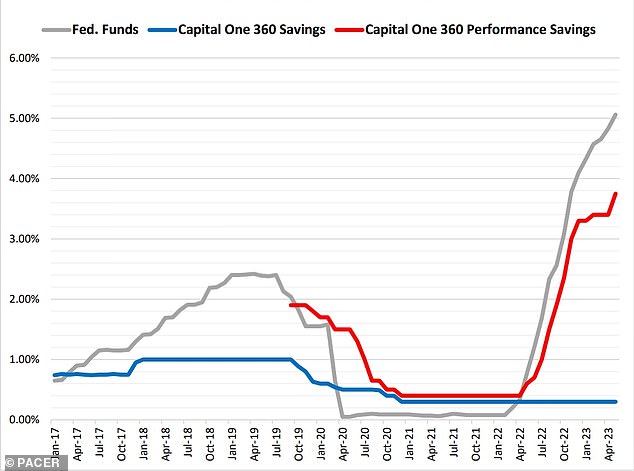Capital One’s devious scheme tricked customers out of $2 billion… now you can get it back
Capital One is accused of defrauding customers of $2 billion in interest payments on savings accounts.
The bank, one of the largest in the US, was sued on Tuesday by the Consumer Financial Protection Bureau (CFPB).
The watchdog said Capital One promised customers that its popular 360 Savings Account offered one of the “top” and “highest” interest rates, but then froze their rates at a modest 0.30 percent, while rates rose nationwide in line with the Federal Reserve benchmark interest rate.
Around the same time, Capital One created a nearly identical product called “360 Performance Savings.”
This differed from the 360 Savings Account only in that it paid substantially more interest – at one point more than 14 times the 360 Savings rate.
The bank failed to inform 360 Savings Account holders about the new product, and instead “schemed” to keep them in the dark about the higher-paying products, the CFPB alleges.
“The CFPB is charging Capital One with defrauding families of billions of dollars in their savings accounts,” said CFPB Director Rohit Chopra. ‘Banks should not bother people with promises they cannot keep.’
The watchdog is demanding compensation for affected customers in its lawsuit, which it expects to win.
It comes a year after customers sued the bank over the same issue, claiming they had been robbed of “millions of dollars” in lost interest.
Capital One is accused of defrauding customers of $2 billion in interest payments on savings accounts
Capital One said in a statement Tuesday that it is “deeply disappointed to see the CFPB continuing its recent pattern of filing lawsuits ahead of a change in administration.”
“We strongly disagree with their claims and will vigorously defend ourselves in court.”
A spokesperson added that the new account – 360 Performance Savings – was widely marketed, “including on national television, with the simplest and most transparent terms and conditions in the industry.”
According to the CFPB, Capital One “illegally misled customers” about the “high interest rate” on the 360 Savings Account, by suggesting that it would earn much more interest than the average account.
It is alleged that the bank purposefully named and marketed the two products similarly holders of 360 Savings accounts were excluded from a marketing campaign advertising 360 Performance Savings to Capital One’s other existing customers.
Capital One is known for its ads featuring the so-called “Capital One Bank Guy,” singer Taylor Swift and Hollywood actor Jennifer Garner.
The watchdog also says Capital One prohibited its employees from proactively telling 360 Savings account holders about 360 Performance Savings.
The CFPB’s lawsuit seeks to stop the companies’ unlawful conduct, provide restitution to injured consumers and impose civil penalties, which would be deposited into the CFPB’s Victim Assistance Fund.
It is not yet known how much money affected customers could receive if the CFPB wins the lawsuit.
In a lawsuit filed in January 2024, plaintiffs made the same allegations.


Capital One is known for its advertisements featuring the so-called ‘Capital One Bank Guy’ and Hollywood actor Jennifer Garner

Singer Taylor Swift also starred in a Capital One commercial in 2022

The gray line represents the Federal Funds Rate set by the US Federal Reserve. In general, interest rates on high-interest savings accounts move in line with the Fed’s rate. When interest rates were low during the Covid pandemic, Capital One capped the interest rate on ‘360 Savings’ accounts at 0.30 percent and raised the interest rate on a new high-yield savings account with a similar-sounding name

“The CFPB is charging Capital One with defrauding families of billions of dollars in their savings accounts,” said CFPB Director Rohit Chopra.

One 360 Savings account holder shared a screenshot from Capital One’s online portal showing that his deposits were earning just 0.30 percent interest
Customers who had Capital One’s 360 Savings account claimed the bank froze interest rates at a record low of 0.3 percent and chose not to notify account holders while creating a new high-yield savings account with a very similar name, which was heavily advertised.
The lawsuit alleged that Capital One closed the old low-interest 360 Savings Accounts to new customers and removed all references to them on their website.
At the same time, they were retaining deposits from old customers, it alleged.
The bank then used the similar-sounding 360 Performance Savings Account to offer a competitive and dynamic rate, which rose to 4.35 percent from January 2024.
From late 2019 to mid-2024, the Federal Reserve raised interest rates from near 0 percent in March 2022 to a 22-year high above 5 percent before cutting rates for the first time in four years in September 2024.
When the Fed raised rates, some holders of high-interest or high-yield savings accounts at other banks enjoyed significantly higher interest on their deposits.
But Capital One isn’t the only bank accused of offering customers paltry savings rates as interest rates have risen.
Last year, an analysis by DailyMail.com found that JPMorgan Chase, Bank of America and Wells Fargo have been unable to raise the annual percentage rate (APY) on their basic savings accounts above 0.01 percent.
By comparison, those same banks typically charge between 5 and 7 percent interest on their thirty-year fixed-rate mortgages.
